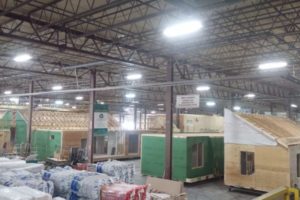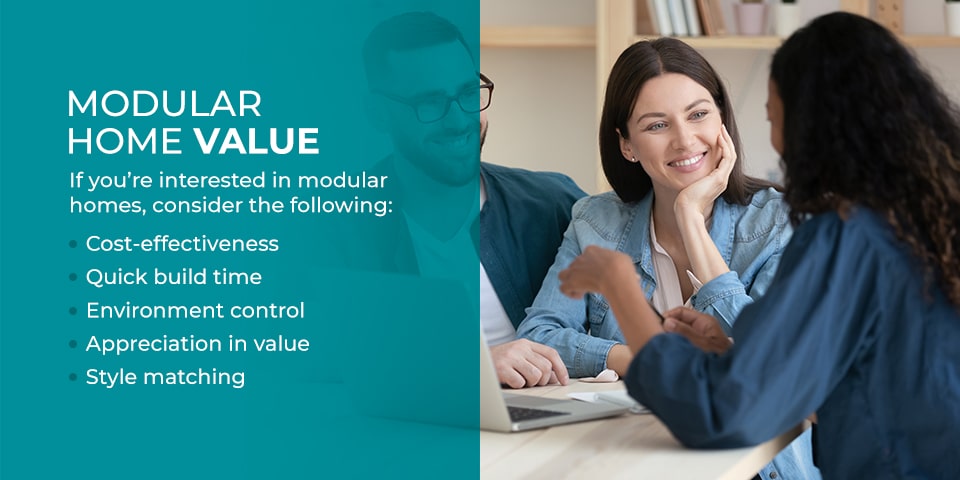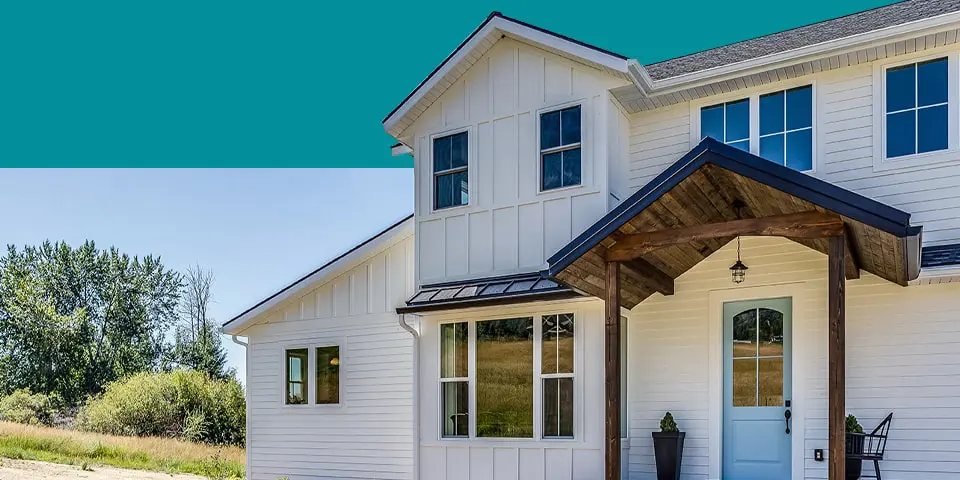Owning a home gives you the opportunity to customize your build, select an ideal location and even rent out your property. How you go about constructing your home is a huge decision, as building methods influence timelines, foundations, materials and more.
The concept of owning a modular home is becoming widely popular for families today. These homes give consumers the opportunity to work with a preset floor plan for quick deliveries and installations – and even with customization building modular is likely much quicker than stick-built homes. Modular homes are excellent investments that are drastically different from manufactured residences.
What Is a Modular Home?
Modular homes are constructed in a factory and get delivered to a plot of land for permanent placement. These homes are incredibly similar to houses that are built on-site, but construction happens on a shorter timeline and in a quality-controlled factory setting. A typical modular home takes between 16 and 31 weeks from design to final placement. Homeowners even have customization options that should suit their vision and needs.

What Is a Manufactured Home?
A manufactured home is also made in a factory, but the home is not permanently placed. Manufactured homes are designed to be portable and move from plot to plot. If you’ve ever been driving and passed a large truck carrying a full-size house, you’ve seen a manufactured home.
These residences often look like mobile homes, and their owners don’t have to commit to settling in one location. Traditional home ownership revolves around having a title to the home and the land surrounding it. Manufactured homes are similar to cars and boats in that you own the home but have to rent the space where it sits.
Since these portable structures tend to be inexpensive, many people — especially those hoping to become first-time homeowners — find themselves evaluating whether manufactured homes are a good investment. The answer will depend on the buyer’s unique circumstances, but they need to bear in mind that these houses may depreciate more quickly than others since they are not considered permanent.

Modular Home Value
Modular homes are a good investment for first-time homeowners. Instead of searching for a home that already exists, homebuyers can select a plot of land and build a home that matches set goals based on their budget. Modular homes rarely depreciate over time because they’re set permanently like on-site built homes.
If you’re interested in modular homes, consider the following:
- Cost-effectiveness: Modular home materials are supplied in bulk, which makes the construction process less expensive than with on-site traditional homes. Since the material requirements are predictable and controlled, building a modular home is also more environmentally friendly and generates less waste.
- Quick build time: Once you get a permit, building will be as simple as fitting pre-measured pieces together. Modular home building can be as short as 16 weeks from start to finish — that’s completion in around half the time of building on-site.
- Environment control: Modular homes provide accuracy with measurements for durability. Instead of materials being cut outdoors, modular home structures are more exact and crafted within a controlled factory.
- Appreciation in value: Modular homes compare to traditional homes in value. These residences can sit in neighborhoods and adapt to any location. Pristine modular builds require less maintenance and hold their value to the market.
- Style matching: Modular homes are customizable. Whether you choose a preset floor plan or design your own modular floor plan, your home will stand out from the next. Multi-floor plans let you cater to your family size and lifestyle.
Investors make considerable profits owning and renting modular homes. If you take the time to seek out the perfect location for one, it can be a gold mine for homebuyers and renters looking to vacation.
Why Are Modular Homes a Good Investment?
People looking for investment properties often struggle to find homes that interest renters. Many existing structures look outdated and unappealing, so they won’t command a premium on the sometimes crowded rental market. The modular home, on the other hand, has the advantage of being a newer concept consisting of sustainable materials and offering rich customization potential. The result is a modern-looking house that’s highly attractive to eco-conscious tenants.
Thanks to their quick construction, modular homes are excellent for investors searching for a property that can begin generating revenue quickly. While building on-site takes many months and is at the mercy of weather and supply chain delays, a modular house can be completed and ready for occupancy in a fraction of that time, making for a much faster return on investment.
For both would-be homeowners and potential landlords, the ability to customize a modular home establishes these structures as exceptional investment opportunities. Whether you want to live in an eco-friendly bungalow ready for solar panel installation or intend to build modern, attractive rentals to support a community needing housing, investing in modular home construction can support your goal.
Who Should Invest in a Modular Home?
Anyone who appreciates green manufacturing practices, quick returns and customization potential will likely find that modular homes are a good investment. These permanent residential structures offer energy efficiency, sustainability and a minimal-waste construction method — all desirable characteristics in today’s market.
Retired couples building after emptying the nest, growing families and would-be landlords all stand to gain from building modular homes.
Contact Design. Build. Modular. for Home Construction
Design. Build. Modular. supplies modular homes to Connecticut, Rhode Island and Massachusetts. Let us help you design your dream home or a lucrative investment property with our turnkey solutions for quick turnarounds and construction. Contact Design. Build. Modular today to learn more about our modular home floor plans and project timelines.
The future of home building has arrived with Design. Build. Modular.

